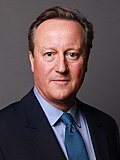A request that this article title be changed to Cameron shadow cabinet is under discussion . Please do not move this article until the discussion is closed. |
Cameron Shadow Cabinet | |
|---|---|
| Shadow Cabinet of the United Kingdom | |
| 2005 – 2010 | |
 | |
| Date formed | 6 December 2005 |
| Date dissolved | 11 May 2010 |
| People and organisations | |
| Monarch | Elizabeth II |
| Leader of the Opposition | David Cameron |
| Deputy Leader of the Opposition | William Hague |
| Member party | |
| Status in legislature | Official Opposition 198 / 650 (30%) |
| History | |
| Election | 2005 Conservative leadership election |
| Outgoing election | 2010 general election |
| Legislature terms | 54th UK Parliament |
| Outgoing formation | 2010 government formation |
| Predecessor | Shadow Cabinet of Michael Howard |
| Successor | First Shadow Cabinet of Harriet Harman |
David Cameron was Leader of the Conservative Party and Leader of the Opposition from his election as Leader on 6 December 2005 until he became Prime Minister on 11 May 2010. His tenure as opposition leader was characterised by opposition to the Great Recession from 2007 to 2009, and his relative youth and inexperience before becoming leader invited satirical comparison with Tony Blair. Cameron sought to rebrand the Conservatives, embracing an increasingly socially liberal position, and introducing the "A-List" to increase the number of female and minority ethnic Conservative MPs.
Contents
- Shadow Cabinet (8 December 2005 – 2 July 2007)
- Shadow Cabinet (2 July 2007 – 13 June 2008)
- Shadow Cabinet (13 June 2008 – 19 January 2009)
- Shadow Cabinet (19 January 2009 – 11 May 2010)
- External links
- See also
Cameron had four Shadow Cabinets during his tenure as opposition leader. His Shadow Cabinet appointments included MPs associated with the various wings of the party. Former leader William Hague was appointed to the Foreign Affairs brief, while both George Osborne and David Davis were retained, as Shadow Chancellor of the Exchequer and Shadow Home Secretary respectively. Hague, assisted by Davis, stood in for Cameron during his paternity leave in February 2006. In June 2008, Davis announced his intention to resign as an MP, and was immediately replaced as Shadow Home Secretary by Dominic Grieve; Davis' surprise move was seen as a challenge to the changes introduced under Cameron's leadership.
Under Cameron, the Conservatives made gains in the 2006 local elections, and made further gains in the 2007 and 2008 local elections. With the onset of the Great Recession leading to the Labour government under Gordon Brown taking the blame from a worsening economic climate, soaring unemployment and the expenses scandal, the Conservatives made significant gains in the local and European elections in 2009.
Following the 2010 general election, Cameron became prime minister at the head of a coalition government between the Conservatives and the Liberal Democrats, as no party had gained an overall majority in the House of Commons for the first time since the February 1974 general election. One of the first decisions he made as prime minister was the appointment of Nick Clegg, the leader of the Liberal Democrats, as deputy prime minister.
